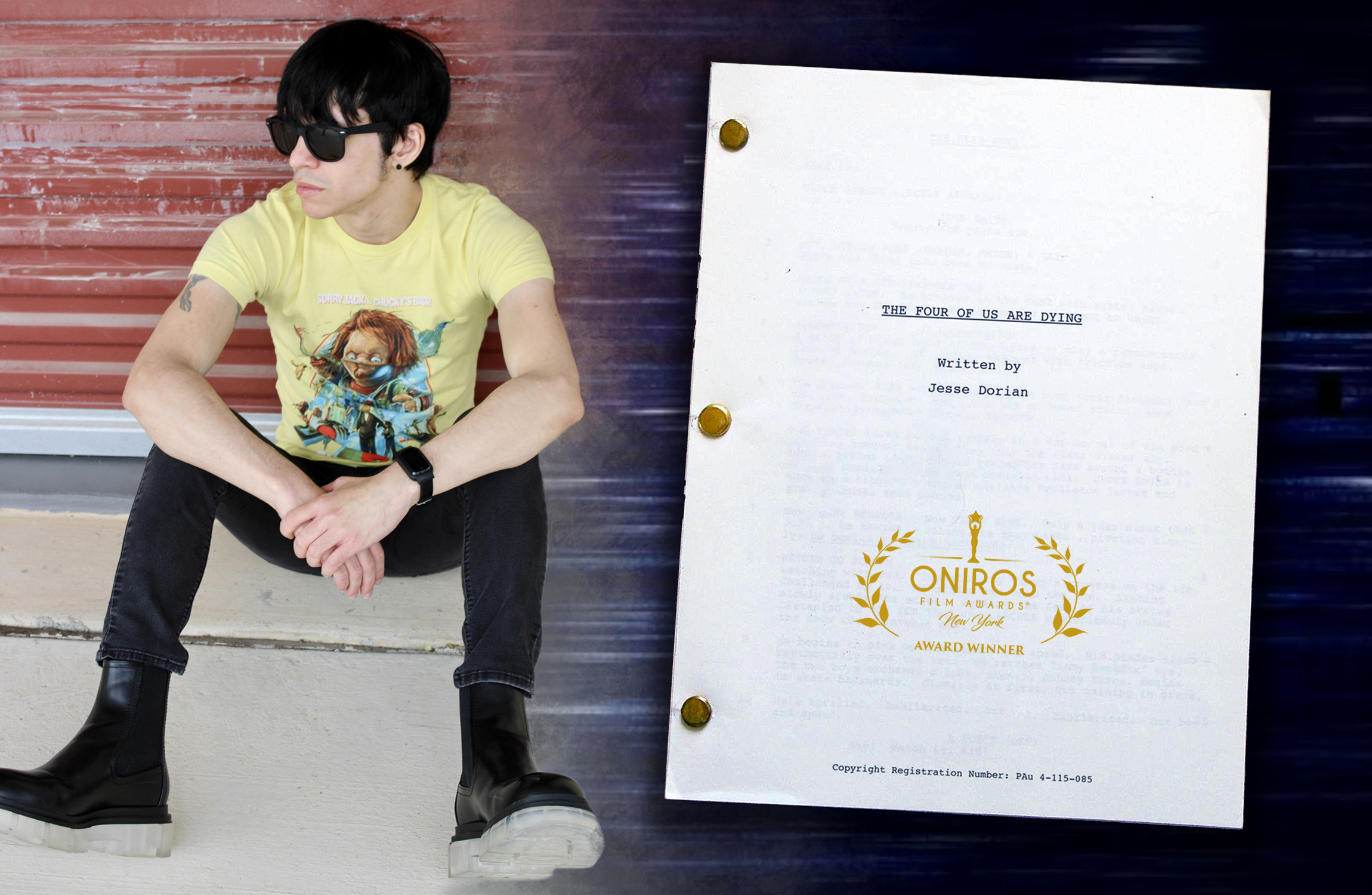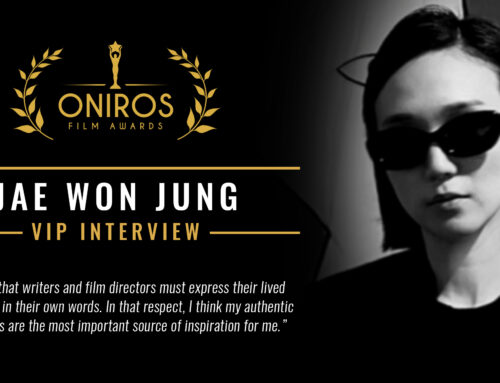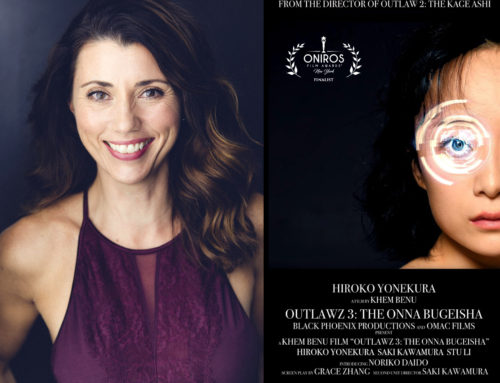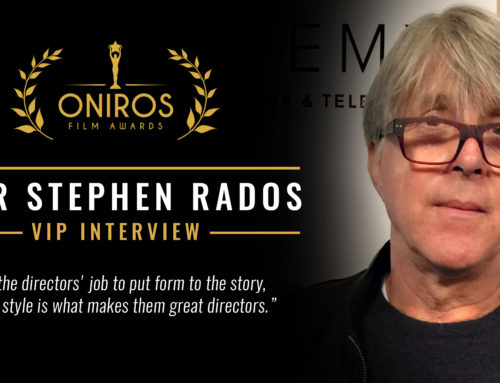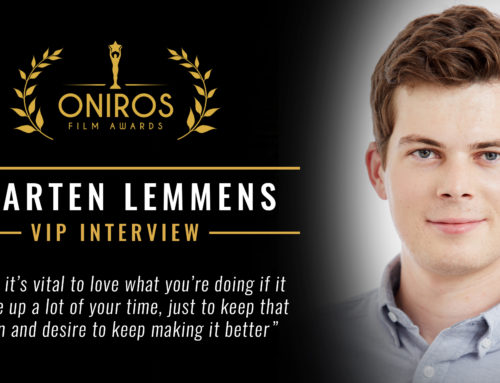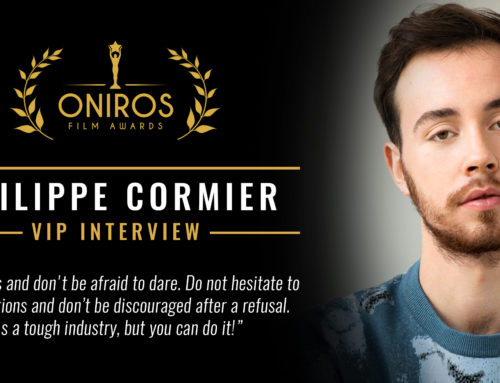BEYOND THE ONIROS FILM AWARDS®
VIP Interview with Jesse Dorian, screenwriter of the feature script ‘The Four Of Us Are Dying’
by Alice Lussiana Parente
Today, we introduce Jesse Dorian, a talented and, let me tell you, very fun to talk to screenwriter. In this interview, we mainly discuss his latest script – The Four Of Us Are Dying – the inspirations, creative process, and character development, but mostly how Jess gets to tell us his own stories. Enjoy!
Jesse Dorian writer of the Award Winning script ‘The Four Of Us Are Dying’ www.thefourofusaredying.com (Photo by Rach Elle)
1. Hi Jesse!
Congratulations again on your multi-wins for The Four Of Us Are Dying! Could you tell us when did you first realize you wanted to become a screenwriter?
Uh, (Laughs) I think it was when I realized that I couldn’t write a novel. Yeah, I’m pretty sure that’s when I realized that I had to be a screenwriter — it was when I didn’t realize that I was already a screenwriter. Because — I never really wanted to be a screenwriter to begin with. I wanted to be a movie star.
It was a long time ago, and maybe it’s from all of the years of reckless substance abuse in my twenties, but in all sincerity… I can’t really recall exactly why I wanted to become a screenwriter. I think it was more, like, I don’t even want to be a writer, let alone a screenwriter. What happened was… I used to read a lot of books as a small child. I was an advanced reader — not just advanced in the volume of content but also advanced in the level of mature subject matter — for years.
And, I mean, I read just about everything, or at least anything, that I could get my hands on in the school library, and the public library, if it looked like intriguing fiction. If it looked like it had a dark edge, or a sense of mystery to it — I read it. I was always attracted to adult themes, and horror. But I also read books that were readily available to my age group.
So, I read everything from Roald Dahl to The Hardy Boys, to Brian Jaques — and then gradually worked up to bestselling graphic fare like Stephen King, and Michael Crichton. Before I was even a teenager.
I read my first Bret Easton Ellis book when I was 13. (Laughs) And I don’t even think you’re supposed to read his books until you’re, like, a repressed 27 year-old libertarian incel.
And so, I think when all of those stories influence you at such an early age — you start to realize that… you want to see if maybe you could write those stories yourself. Maybe my imagination has something exciting to present. And how exactly can I tell stories? How can I tell My stories?
Well, conveniently enough — there was one medium that I was infatuated with even more than books — and that was film. I had tried writing stories in the format of a novel and I never made it more than probably a full page. I remember that it just didn’t feel right, even for that age. And when I was a kid, I was so consumed with films that were adapted from books. I figured out by the time I was 14, that screenwriting was the format that made sense to me. The Screenplay, as a visual format, was the correct format for me, and for my ideas.
And not much has changed, really. (Laughs) I still want to be a movie star, and I still don’t want to be a screenwriter.
2. Where does the inspiration of The Four Of Us Are Dying come from? Can you describe your creative process when writing a script?
I think when I first started writing The Four of Us Are Dying, I didn’t even know that it was going to have anything to do with extra terrestrial life forms, let alone become a Sci-Fi thriller in its third act.
I had just finished writing a horror thriller entitled As Scared As You, and so I had just assumed at the time that — Four of Us was just going to be a continuation of that sort of cinematic universe. I didn’t realize it was going to be something entirely different. As Scared As You was the first time that one of my stories had gone completely balls-to-the-wall regarding the extremity of the subject matter. And, I wanted to sorta explore that a little more but maybe not in quite the same cold-hearted, and mean-spirited way as I had just done with As Scared As You.
3. What is the message you wanted to communicate to the audience through this story?
Okay, so first, I would like to just clarify that — whenever I start writing a screenplay, it’s never about the message. Ever.
The message only really begins to appear after the story is all said, and done. Because if the message is prioritized, you know — to come before the story, it’s going to show. I’d be openly pandering for pay. And then, I might as well be writing a fucking religious movie at that point; a faith-based fuckfest, or whatever.
All I really care about — is telling a great story, and that said story is distinct in its execution.
And then, once that vague excuse for a message begins to form, then… maybe I’ll go back and tweak a few things in the script to make the message more firm, and a little clearer to the audience.
To me, the message IS the afterthought.
In the end, I have full-faith in the audience. And to me, a film’s message means absolute dick, if the audience isn’t having a hell of a time.
4. Can you tell us more about the choice of this specific title?
I just think it’s a really fucking cool title. For one, The Four of Us Are Dying is also the title of an instrumental Nine Inch Nails track that I’ve always loved. I’ve always been a Nine Inch Nails fan, and Trent Reznor’s… always naming his tracks after the titles of obscure Twilight Zone episodes — which, I totally get.
It’s one of the single-most influential television shows of all-time; a lot of its episodes have a lot of cool titles — and… I haven’t seen (Laughs) every single Twilight Zone episode but conveniently enough — I have seen the episode The Four of Us Are Dying, which is completely unrelated to my story.
The Twilight Zone episode is about a shapeshifter, whereas my The Four of Us Are Dying story is about interspecies polyamory, the need for belonging, and how traditional families comfortably fail us when realizing the full scope of their identities.
But at the fear of sounding pretentious, I usually just say that The Four of Us Are Dying is “a quippy little road trip thriller that features a kidnapping, a massive government conspiracy, and an essential orgy that may – or may not – include alien fucking.”
5. Who are the screenwriters that inspire you the most?
Honestly, I’m really not that inspired by screenwriters in general — unless they’re screenwriters that are taking notable risks.
But typically, those screenwriters are probably also producing their screenplays themselves, if not already directing them.
Without disingenuously name dropping, I would say… I’m probably at least somewhat inspired by the screenwriters who are the most successful in getting their original vision to the big screen without allowing too many producers or — the studio, from neutering the story and just fucking ruining it in the process.
Although, (Rolls Eyes) I’m not going to pretend like I would never side with a major studio. For the sake of appealing to more than just ego, some screenwriters totally deserve to be neutered.
6. You are a very prolific writer, The Four of Us Are Dying is in fact the fourth of four screenplays. I know you said that they are all unrelated, but I was wondering if you can share with us if there’s a link or a connection between these stories?
Rù(Laughs) Oh, yes, there is a connection, alright. The connection is — I completed the first drafts of all four of these stories during both a manic episode, and the aftermath. The manic episode was supposedly from undiagnosed Bipolar I at the time… although, my current psychiatrist is skeptical. He believes my manic episode from way back then was primarily due to severe alcohol abuse since I’ve yet to have another episode since but… alcohol, or no alcohol, I’m still clinically depressed, so… anyway, yeah. (Laughs) My mental health will always be an open case, I’m afraid.
These four stories were all written within a span of a few months, which in retrospect, was a complete blur to me.
7. Have you ever experienced a writer’s block? If yes, what’s the best piece of advice that was ever given to you to overcome it?
Okay, so, I don’t really get writer’s block. I have ADD/ADHD — and that is something that is not under question. (Laughs) My attention span is almost always in jeopardy. So, whenever I do get stuck while writing — which is rare, I think it’s typically due to me losing interest with the subject matter.
Either that, or I’m deeply distracted by something else going on in my life. Granted — every screenplay I’ve ever written up to this point wasn’t a hired gig. So, if real money were to ever be involved, well, shit. If that were ever the case, I could probably invent the ultimate solution to overcoming writer’s block as a side quest to finishing the script I was initially hired to do. Because half of the good things I’ve ever done seem to be by accident.
The best piece of advice for writer’s block? Um, I always hear writers say to go outside for fresh air, or succumb to vigorous daily routines, or exercise but seriously — I don’t know if any of that shit really works. I’m sure it does for most people. But honestly, I’m not the right person to ask about what I would do to overcome writer’s block.
I’m actually much more concerned with learning how to overcome the dilemma of waking up ten times in the middle of the night; and learning how to sleep uninterrupted.
Jesse Dorian writer of the script ‘The Four Of Us Are Dying’ www.thefourofusaredying.com (Photo by Rach Elle)
8. The story is all set in New Mexico or in the Arizona deserts. Why did you choose this location? And how does the arid landscape influence the story?
During my manic episode back in 2012, and 2013, I drove straight through from New Braunfels, Texas, and Austin, Texas — to Los Angeles. And then back — to New Braunfels, and Austin. That’s why I chose that landscape.
After staring at it for so long, it just seemed inevitable that I’d write a movie that is mostly set in the middle of nowhere.
The only thing that I was hesitant about, I think, was the inclusion of an Area 51-inspired government facility because — that area of New Mexico is already often associated with supposed alien sightings and government conspiracies. And since all of that shit regarding conspiracy theories, and alien sightings is just so stupid to me, I figured I could make it not-so-stupid, if incorporated correctly into the right story, with the right characters.
9. Sara is the ultimate antihero. She is a cold blooded killer with a mysterious past, a “cool as fuck” fearless young woman that would do anything to reach her goal. How did you develop her character?
Sara is ultimately the perfect woman. At least I think she’s the perfect woman: she’s always in control. And, she’s incredibly competent when she wants to be.
And the fact that Sara is always in control, is a highlight that I think has majorly contributed to why the character has been so well-received by readers, and judges of the script, in general.
However… I wouldn’t say that Sara is necessarily the best girlfriend because you know, she kills people. Although, that’s not always a deal breaker nowadays, especially if you’re indifferent to consequence.
But Sara has seen things that literally, the rest of humanity could not even begin to imagine. And at some point, Sara had figured out what the meaning of life was. And for the rest of the human race, unfortunately, they’ll never get to know exactly what that is. For Sara, at least, what the meaning of life did not mean was — protecting the lives of her own species. She figured that most human beings are disposable.
However, Sara is not a nihilist. She knows when the lives of others truly matter. Sara is a human being that’s operating on a higher level than everyone else. And the reality isn’t that Sara doesn’t care about people; the reality is that people are shit.
10. There is a big reveal toward the end of the script. We finally find out more about Sara’s past and what happened during those six days when she disappeared. What had started as a road trip thriller script becomes more of a sci-fi story. How did you work out this shift?
I have no idea. I just started writing the story and that’s where it wound up. I’m sure whiskey courage had a lot to do with it at the time (Laughs).
I probably figured, “Hey. I haven’t done aliens yet. Maybe now is the time.” (Laughs) Who knows.
My life was in a very weird place when I first wrote this story — and that probably comes as a surprise to absolutely no one.
11. In cinema we’ve seen many examples of aliens, all with very different physical representations and relationships to humans. From childish and collaborative in Spielberg’s universe in movies such as ET and Close Encounters of the Third Kind to the aggressive reptile-like extraterrestrials in Signs and armed Martians of War of the Worlds (just to mention a few). I was wondering which movies inspired you the most when writing the character of Zaan?
Holy fuck, that’s a great question. Um, okay… hmmm, (Laughs) where do I begin unpacking?
Okay. So, first… I think Zaan is kind of his own cinematic anomaly. Zaan is sorta his own thing. And without giving too much away, he has to be portrayed in such a way… that the audience could find it somewhat believable that a human being who knows Zaan personally, could also find him ‘fuckable.’ Even though — Zaan’s a completely different species.
Again — this is a great question because I haven’t really thought about which particular movies inspired me the most when writing Zaan. All I could really comprehend when writing him, was that he needs to somehow appear attractive, physically… while at the same time — obviously not being human; and in a way that is entirely plausible to the audience.
Think — less ET, and more X-Files.
Now, for another reason that this is such a great question, and — for the real part of the question that I actually want to talk about: Spielberg. So, yeah, I’ve always found Spielberg to be hugely influential. Me, and every other wannabe filmmaker — (Laughs) we love Spielberg. I feel like we all go through our very own Spielberg phase.
And as much as I love Spielberg, and as much as I loved ET when I was a kid… as an adult, I have a difficult time appreciating ET. I just can’t connect with it. (Laughs) ET just… (Groans) he looks like a shriveled testicle. I don’t like him. Normally, I would say, “does that make me sound heartless?” But — he’s a fucking puppet. Like — Chucky. Or, Gremlins. So — no. Sorry, not sorry. Maybe I’m out of touch? Who knows.
And, I get it — the heart, and soul of ET, and why it supposedly works, is because you’re supposed to get past the fact that he looks like a shriveled nutsack. I genuinely love the message. But it’s one of those rare films that I just don’t connect with like everyone else who saw it. (Laughs) I’m trying to make sense of my criticism of it.
Close Encounters, I haven’t seen in probably at least 20 years, so… no comment? (Laughs)
Now, War Of The Worlds?! I fucking love it — and I think it’s one of Spielberg’s most under-appreciated films next to A.I. Artificial Intelligence.
I love when Spielberg goes dark, and borderline nihilistic. ‘Dark Spielberg’ is my favorite. I love ‘Temple of Doom Spielberg.’
And this coincides with the point of the question… ‘Black Sheep Spielberg’ takes risks that ‘Commercial Theme Park Spielberg’ does not.
It’s crucial, that filmmakers, like Steven Spielberg, understand that it’s the biggest risks that they’ve taken in their long careers, and the unconventional steps out-of-sync with the mainstream, that directly influences the next generation of filmmakers — more than anything else — to run out, and take big risks of their own.
I wrote a feature script called SVEN, which is definitely influenced by ‘Dark Spielberg.’
But The Four of Us Are Dying surprisingly, is not. Because it’s not really supposed to include the sense of awe that Spielberg’s extra terrestrial-themed films do.
I mean, The Four of Us does include a sense of mystery, and even a sense of dread, regarding the overall tone of the story.
12. Kevin and Sara and Andrew and Lauren all have one thing in common: they are all self-destructive in different ways. It seems to me that there are no innocent characters in this story, and that none of them shy away from their skepticism and darker side. Can you elaborate more on the reasons for this choice?
(Laughs) I’m not sure if this comes as a surprise, but I think conventional heroes are boring.
There’s also something I should clarify, that I don’t hear a lot of people, if anyone, talk about regarding the moral connection between film characters — and the audience. I’ll explain.
Okay, so, there is a difference between writing a character that is unlikeable because they are a well-written character who does bad things that the audience can’t identify with — intentional… and, a character that is unlikeable simply because they are poorly written — which is, of course, unintentional.
There is also a difference between characters who do bad things, that are still likable because they are well-written, charismatic, and relatable… and characters who do good things that are still unlikeable because they are simply, again, poorly written, etcetera. You get the point.
If you look at a character, like, say, Hannibal Lecter… he’s technically a villain. And he is, in the traditional sense, a bad person. But — we like him, anyway. (Laughs) Or, at least some of us do. But — why do we like him? This incarcerated serial killer, and cannibal with a reputation for biting peoples’ faces off. Well, I personally think — it’s because we appreciate the confrontational nature of Hannibal Lecter, in regards to his ability to detect bullshit. He’s an intellectual. He’s charming — or, at least while he’s behind a reinforced plexiglass wall, he’s charming. And, he doesn’t insult our intelligence, which is key — to getting the audience on the same side as your characters.
If you were to set this sort-of physical, quadrant pie chart-looking diagram up, and then you were to place Sara, Kevin, Lauren, and Andrew on the diagram — I think the audience could potentially debate which sectors these four characters fall into, in regards to who the audience should be rooting for, and why — if, any of them. Because none of them are morally, very good people. And that’s the point. Because they’re all going to die — although, not in the traditional sense (Laughs).
So, will the audience care which characters die, and which characters do not die? In the context of The Four of Us Are Dying, what even really qualifies as “death?”
Personally, I don’t think that a single one of my characters insults the intelligence of the audience. At least on paper, they don’t.
And, so what? My characters are not typically innocent — but in addition to that, it also doesn’t mean that they’re all bad, all the time. And it also doesn’t mean that they have to be poorly written either, in order for the audience to decide this.
What I think matters most is, quite obviously, that the audience connects with Sara. If the audience connects with Sara, I think the film will work for most people.
Because in the world that I’ve set up for these characters, Sara is the hero. Whether you like it, or not. That’s the way I see it. That’s just my opinion. But — if someone were to disagree with me, and insist that a different character is the true hero of the story, they probably wouldn’t be wrong either.
13. SPOILER: Zaan is described in a very human-like way and toward the end we see the true nature of the relationship with Sara. Do you see this as a happy ending where true love overcomes all obstacles?
Oh, absolutely. Because fuck the human race? (Laughs) No, well… yes, and no. For one, I probably haven’t met more than ten people in my entire lifetime that even know what the fuck true love is — and, I’m one of them, however… I’d like to at least think that I have an idea — that I know what true love is, and I just haven’t experienced it for myself.
So, yeah (Laughs) in my opinion — and, I’m not just saying this because I’m an optimist — I think that The Four Of Us Are Dying has a happy ending. But that’s only because I’ve thought about the ending so much at this point. And when other people get to experience the ending, it might also take some of them a moment to really understand exactly why it is.
14. What is the most challenging project you’ve completed? What did you learn from it?
Keyword — completed. (Laughs) I’m sorry, but that’s a bit loaded. Or, at least for a massively insecure person, like me, and because nothing I ever do feels finished to me — answering that question with a genuine response… it makes me deeply uncomfortable. I would like to move on to the next question. Somebody, please kill me.
15. What’s next for you? What are you working on at the moment?
Aside from further developments on all of my unproduced feature screenplays, I’m working on a lot of things, actually. An e-commerce store with all of my original designs and ideas, called LostScorpion… a solo music artist project called Imitate Invertebrate, which is, oddly enough, the only project of mine that, on a deeper level, actually makes sense to me — probably because its personally therapeutic… these are all projects I’m hoping to spend more time working on this year, which… it’s all sort of a nightmare, to be honest. I still don’t really know how to relax. (Laughs)
Maybe that’s something I should start working on too.
